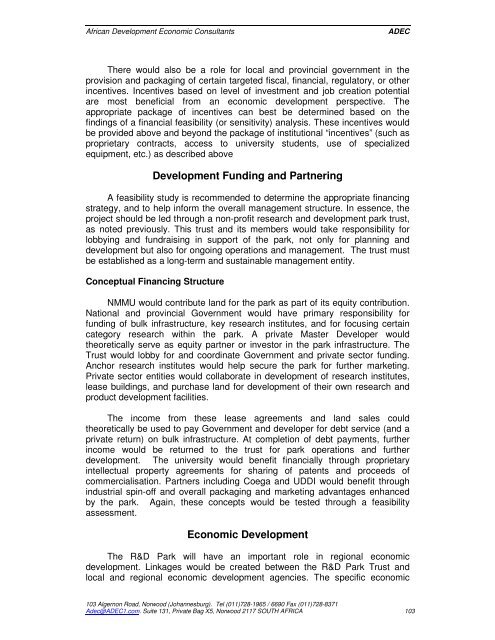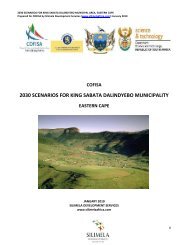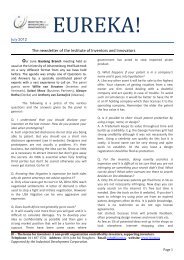pre-feasibility assessment report - Innovationeasterncape.co.za
pre-feasibility assessment report - Innovationeasterncape.co.za
pre-feasibility assessment report - Innovationeasterncape.co.za
You also want an ePaper? Increase the reach of your titles
YUMPU automatically turns print PDFs into web optimized ePapers that Google loves.
African Development E<strong>co</strong>nomic ConsultantsADECThere would also be a role for local and provincial government in theprovision and packaging of certain targeted fiscal, financial, regulatory, or otherincentives. Incentives based on level of investment and job creation potentialare most beneficial from an e<strong>co</strong>nomic development perspective. Theappropriate package of incentives can best be determined based on thefindings of a financial <strong>feasibility</strong> (or sensitivity) analysis. These incentives wouldbe provided above and beyond the package of institutional “incentives” (such asproprietary <strong>co</strong>ntracts, access to university students, use of specializedequipment, etc.) as described aboveDevelopment Funding and PartneringA <strong>feasibility</strong> study is re<strong>co</strong>mmended to determine the appropriate financingstrategy, and to help inform the overall management structure. In essence, theproject should be led through a non-profit research and development park trust,as noted <strong>pre</strong>viously. This trust and its members would take responsibility forlobbying and fundraising in support of the park, not only for planning anddevelopment but also for ongoing operations and management. The trust mustbe established as a long-term and sustainable management entity.Conceptual Financing StructureNMMU would <strong>co</strong>ntribute land for the park as part of its equity <strong>co</strong>ntribution.National and provincial Government would have primary responsibility forfunding of bulk infrastructure, key research institutes, and for focusing certaincategory research within the park. A private Master Developer wouldtheoretically serve as equity partner or investor in the park infrastructure. TheTrust would lobby for and <strong>co</strong>ordinate Government and private sector funding.Anchor research institutes would help secure the park for further marketing.Private sector entities would <strong>co</strong>llaborate in development of research institutes,lease buildings, and purchase land for development of their own research andproduct development facilities.The in<strong>co</strong>me from these lease agreements and land sales <strong>co</strong>uldtheoretically be used to pay Government and developer for debt service (and aprivate return) on bulk infrastructure. At <strong>co</strong>mpletion of debt payments, furtherin<strong>co</strong>me would be returned to the trust for park operations and furtherdevelopment. The university would benefit financially through proprietaryintellectual property agreements for sharing of patents and proceeds of<strong>co</strong>mmercialisation. Partners including Coega and UDDI would benefit throughindustrial spin-off and overall packaging and marketing advantages enhancedby the park. Again, these <strong>co</strong>ncepts would be tested through a <strong>feasibility</strong><strong>assessment</strong>.E<strong>co</strong>nomic DevelopmentThe R&D Park will have an important role in regional e<strong>co</strong>nomicdevelopment. Linkages would be created between the R&D Park Trust andlocal and regional e<strong>co</strong>nomic development agencies. The specific e<strong>co</strong>nomic103 Algernon Road, Norwood (Johannesburg). Tel (011)728-1965 / 6690 Fax (011)728-8371Adec@ADEC1.<strong>co</strong>m. Suite 131, Private Bag X5, Norwood 2117 SOUTH AFRICA 103





